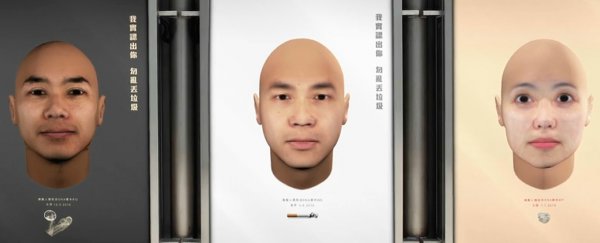Next time you're about to carelessly throw your old gum or cigarette butt onto the street, stop and remember that scientists can now use your DNA to create a freakishly accurate sketch of your face. And advertisers can use that sketch on billboards to publicly shame you for littering.
It sounds like something out of science fiction, but that's exactly what's happening in Hong Kong right now, with ad agency Oglivy creating these high-tech and undeniably creepy ads for the not-for-profit group Hong Kong Cleanup's 'Face of Litter' campaign.
The idea behind the campaign is straightforward enough - if the threat of polluting the environment doesn't dissuade litterers, maybe public shaming will. But the science is quite complex and still very experimental. The technology was developed by researchers at Parabon Nanolabs in the US in collaboration with the US Department of Defence in order to better help out criminal investigations.
The process works by taking a tiny sample of someone's DNA, which has been left behind on the litter in Hong Kong, and sending it across to Parabon. Here, it's sequenced to look for traits that are extremely heritable, which means they're not likely to have been changed much by the environment, such as eye colour, skin colour, freckling and face shape.
"This data, when processed with Parabon's machine-learning algorithms, begins to form a rough snapshot of certain phenotypes, or traits," writes Liz Stinson over at Wired.
The tests are far from perfect - the researchers still struggle to work out traits that are controlled by multiple genes, such as hair texture (straight or curly) and height. They also can't work out someone's age from their DNA alone. But Oglivy helps out in this regard by using their market research to predict which age groups are most likely to discard which litter - for example, 18- to 34-year-olds are the most common litterers of gum.
The resulting images, they hope, will "put a face" to the anonymous crime of littering. Obviously we have no photos of the original litterers to compare the sketches to, but according to Oglivy, the results are accurate.
Before you start freaking out about the (significant) invasion of privacy and the ethical issues associated with making a DNA-based sketch of someone's face and using it to embarrass them, don't worry, Oglivy insists it received permission from every person whose trash DNA they used. And Parabon says its services are usually only available for criminal investigations.
But the campaign still opens up some important discussions about how we deal with these issues as DNA testing gets more accurate - and more accessible - in future. And the idea of using experimental science for the good of the environment? We love it.
